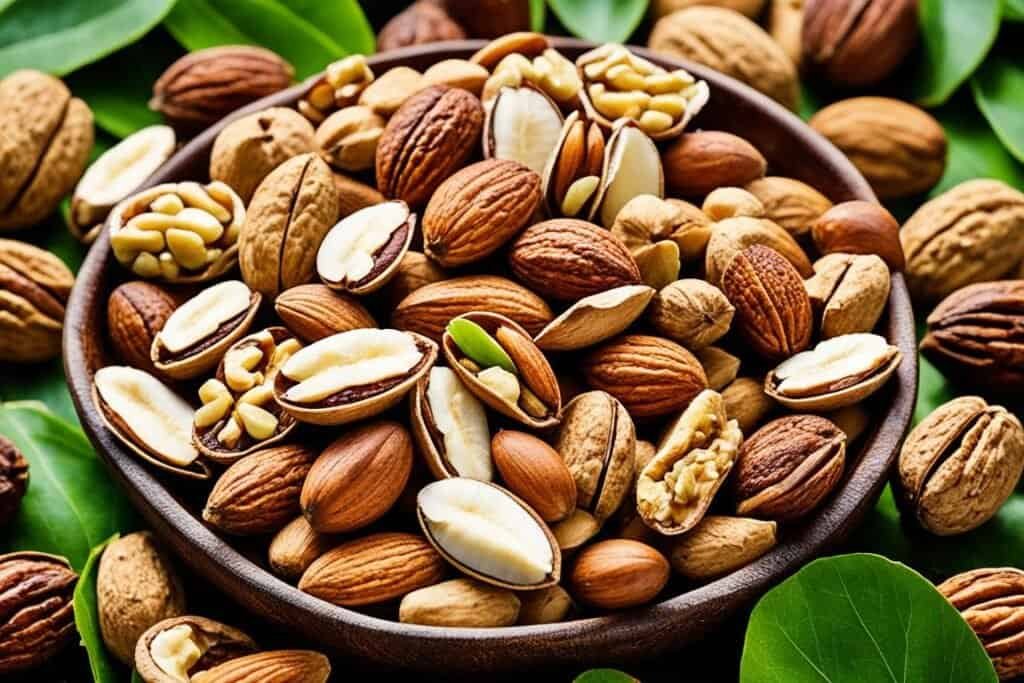Lowering cholesterol levels and promoting a healthy heart is essential for overall well-being. Fortunately, there are several foods that can help in achieving this goal. According to various studies and reviews, incorporating specific foods into your diet can have a positive impact on cholesterol levels.
Legumes, such as beans, peas, and lentils, have been shown to effectively lower LDL cholesterol, which is often referred to as “bad” cholesterol. Including legumes in your meals can not only reduce cholesterol levels but also decrease the risk of obesity, diabetes, high blood pressure, and inflammation.
Key Takeaways:
- Legumes, like beans, peas, and lentils, can help lower LDL cholesterol.
- Adding legumes to your diet may reduce the risk of obesity, diabetes, high blood pressure, and inflammation.
Legumes
Legumes, including beans, peas, and lentils, are highly beneficial for your heart health. These plant foods are packed with essential nutrients and have been found to lower LDL cholesterol levels, reducing the risk of heart disease.
- Beans: A recent study conducted in 2021 showed that consuming just 1 cup of beans per day can significantly lower LDL cholesterol levels. Incorporating beans into your daily diet is a simple and effective way to improve your heart health.
- Peas: Another review from 2019 revealed that incorporating legumes like peas into your diet can help lower LDL cholesterol, further reducing the risk of heart disease.
- Lentils: Lentils are not only a great source of protein but also have cholesterol-lowering properties. Adding lentils to your meals can help improve your cholesterol profile and promote heart health.
Additionally, consuming legumes may also have other significant health benefits. Research suggests that legumes can help decrease the risk of obesity, diabetes, high blood pressure, and inflammation, making them an important component of a balanced and heart-healthy diet.
With their cholesterol-lowering properties and numerous health benefits, it’s clear that legumes should be a staple in your diet. From beans and peas to lentils, these versatile and nutritious foods can make a positive impact on your overall health and well-being.
Avocados
Avocados are a rich source of monounsaturated fats and fiber, which have been shown to lower LDL cholesterol and raise HDL cholesterol levels. Including avocados in your diet can be a great way to promote heart health and reduce the risk of cardiovascular diseases.
Research has demonstrated the cholesterol-lowering benefits of avocados. In a study conducted on adults with obesity, those who consumed one avocado daily experienced a greater reduction in LDL cholesterol levels compared to those who didn’t include avocados in their diet.
Another review concluded that substituting avocados for other fats led to lower total cholesterol, LDL cholesterol, and triglyceride levels. This suggests that avocados can be a smart choice for individuals aiming to improve their cholesterol profile and maintain a healthy heart.
There are various delicious ways to incorporate avocados into your daily meals. You can add slices of avocado to salads, mash it up to make guacamole, or spread it on toast for a nutritious and satisfying snack. By incorporating avocados into your diet, you’ll not only enjoy their creamy texture and subtle flavor but also benefit from their heart-healthy nutrients.
So go ahead and indulge in some avocados to support your heart health! Remember to consume them in moderation as part of a well-balanced diet.

Nuts
Nuts, including walnuts, almonds, cashews, peanuts, and pistachios, are not only delicious but also beneficial for your heart health. These nutrient-rich snacks have been found to lower levels of LDL cholesterol, triglycerides, and total cholesterol, reducing the risk of cardiovascular disease.
Research has shown that daily nut consumption can lead to a significant 30% lower risk of heart disease. This is due to the presence of omega-3 fatty acids in walnuts, which have been associated with improved heart health and lower LDL cholesterol levels.
Additionally, almonds contain phytosterols, plant compounds that may help lower LDL cholesterol levels. Including a variety of nuts in your diet can provide you with a wide range of heart-healthy nutrients.
To reap the benefits of nuts, try incorporating them into your meals and snacks. You can enjoy a handful of mixed nuts as a mid-morning or afternoon snack, sprinkle chopped nuts over salads or roasted vegetables, or use nut butter as a spread on whole grain toast or fruit slices.

| Nut | Omega-3 Fatty Acids (g per 100g) | Phytosterols (mg per 100g) |
|---|---|---|
| Walnuts | 2.5 | 36 |
| Almonds | 0 | 38 |
| Cashews | 0.05 | 22 |
| Peanuts | 0.01 | 80 |
| Pistachios | 0.07 | 231 |
Conclusion
Incorporating cholesterol-lowering foods into your diet can be a natural and effective way to lower cholesterol levels and promote a healthy heart. By including a variety of foods such as legumes, avocados, nuts, fatty fish, whole grains, fruits and berries, dark chocolate, garlic, soy foods, vegetables, tea, dark leafy greens, and extra virgin olive oil, you can reap the benefits of their cholesterol-lowering properties.
A cholesterol-lowering diet doesn’t have to be restrictive or boring. There is a wide range of delicious and nutritious options to choose from. You can enjoy meals like a refreshing lentil salad with avocado, a handful of mixed nuts as a snack, grilled salmon with whole grain rice and steamed vegetables, or a dark chocolate and berry smoothie.
By adopting a low-cholesterol diet that incorporates these cholesterol-lowering foods, you can improve your overall health and reduce the risk of heart disease. Remember to consult with a healthcare professional or registered dietitian for personalized guidance and to ensure the diet fits your specific healthcare needs.

